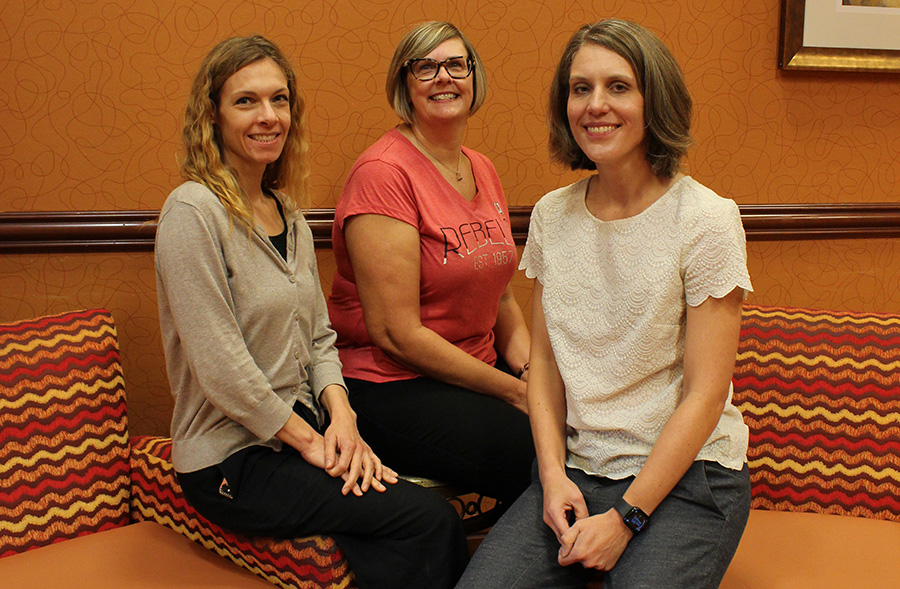A guiding light for other states

Sara Hunt, PhD, (center) Assistant Dean of Behavioral Health Sciences at the Kerkorian School of Medicine at the University of Nevada-Las Vegas, with BHECN’s Erin Schneider, EdD, (right) and Marley Doyle, MD, (left). Dr. Hunt incorporated major features of BHECN’s structure and mission in advancing legislation to create a similar behavioral health workforce center in Nevada. BHECN’s model also helped influence the creation of a similar center in Illinois.
While BHECN plays a key role in helping address the state of Nebraska’s shortage of behavioral health care workers, the organization also serves as a model for other states that face similar issues.
The most recent example of this came earlier this year when the Nevada Legislature passed a measure to create a behavioral health workforce center that is largely modeled off BHECN. In fact, it was attending a webinar about BHECN’s work that gave Sara Hunt, PhD., of the University of Nevada-Las Vegas, the idea to start a similar center in The Silver State.
“BHECN certainly served as a blueprint for what we are creating here,” said Dr. Hunt, Assistant Dean of Behavioral Health Sciences at the Kirk Kerkorian School of Medicine at UNLV and Director of the UNLV Mental/Behavioral Health Training Coalition.
Similar states, similar solutions
After attending the webinar, Dr. Hunt took up the cause and for the past several years, she helped spearhead a legislative effort to get a BHECN-type center created in her state, which has some of the same geographical and demographic challenges that face Nebraska.
Like Nebraska, Nevada has two major metro areas – Las Vegas and Reno – while the rest of the state is largely rural and frontier land. Another similarity between the two states is the vast majority of both states are designated as having shortages of behavioral health workers.
“Throughout most of the state, we don’t have enough people to help meet the behavioral health needs,” Dr. Hunt said, noting that the county Las Vegas sits in actually is considered a shortage area.
Providing education, training, other resources
Like BHECN does in Nebraska, the new Nevada center will work to address the shortage by introducing and connecting young people to behavioral health careers while supporting providers already working in the fields by providing education, training and other resources to help them do their jobs and continue to work in the state, Dr. Hunt said.
Throughout the process of getting the legislation passed to create the Nevada center, Dr. Hunt and others from Nevada spoke regularly with BHECN officials to get guidance on how to create a workforce development center and how to get it passed through the legislative process.
Their work paid off in June when Nevada lawmakers approved funding to create a center, which will be a collaborative operation between UNLV and other Nevada System of Higher Education institutions. The goal is for the new center to be operational by the end of 2023, Dr. Hunt said.
Other states are taking cues from BHECN
With the creation of the new center, Nevada becomes the third state to have such an organization, joining Nebraska and Illinois, which in 2018 passed nearly identical legislation to what Nebraska used to create BHECN when starting its Behavioral Health Workforce Center. Officials in Connecticut also have consulted with BHECN as they begin discussions about creating a behavioral health workforce center in that state.
Having other states emulate BHECN’s efforts is validating and rewarding and it helps highlight the wisdom Nebraska policymakers have shown in creating and supporting the organization over the years, said BHECN Director Marley Doyle, MD.
“It’s gratifying to know that others can look to the work we do here in Nebraska to help strengthen the workforce and improve care in other parts of the country,” Dr. Doyle said. “It makes me proud to be part of the amazing BHECN team and it should be a point of pride for all who are involved in supporting and advancing our work.”